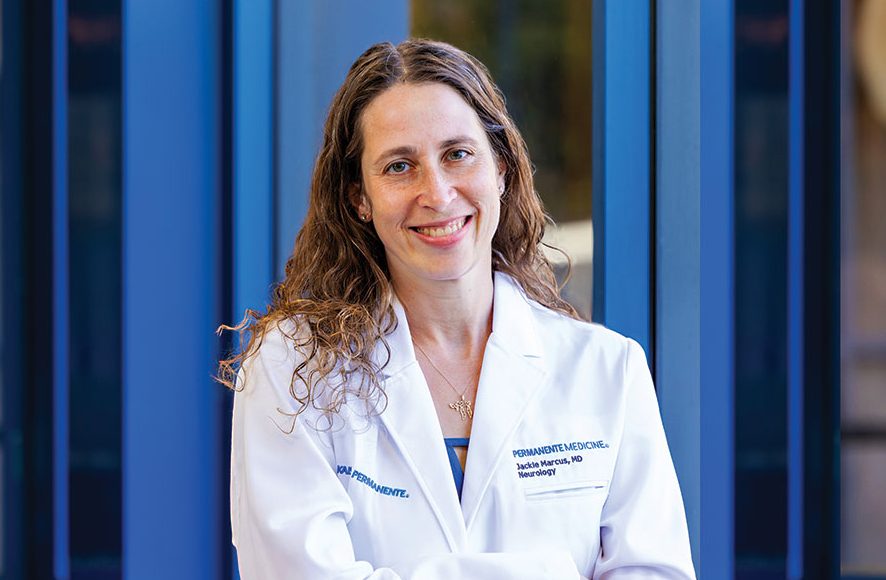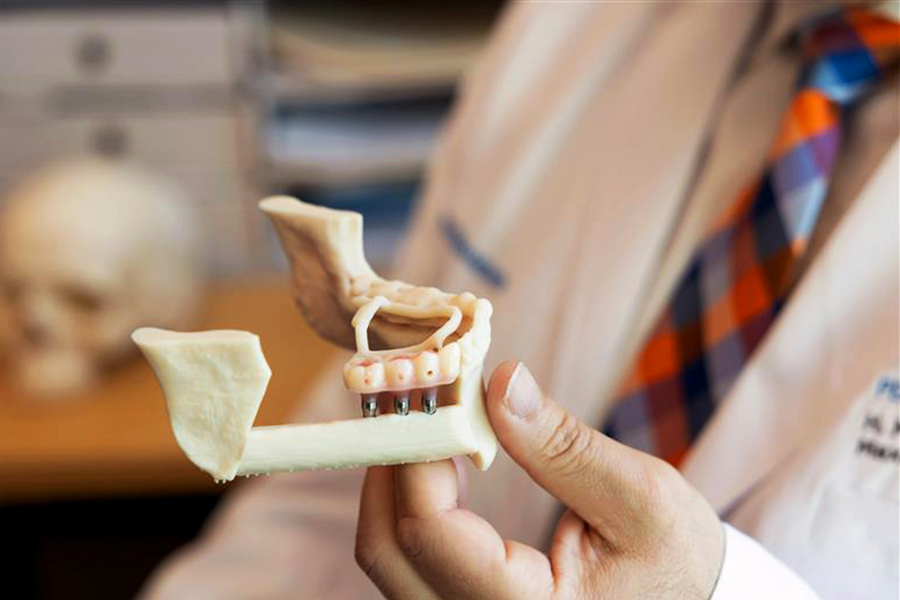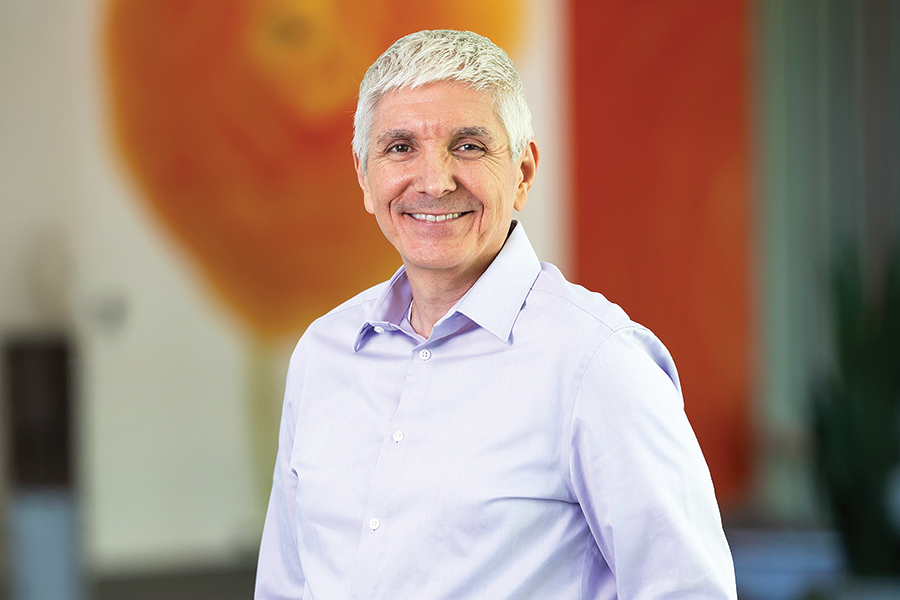Neurologist Jacqueline Marcus, MD, has built a multidisciplinary MS program in Kaiser Permanente Northern California that supports patients at every turn.
December 20, 2024
Treatment for multiple sclerosis was poised to advance dramatically when Jacqueline Marcus, MD, joined The Permanente Medical Group (TPMG) a dozen years ago. Medications to modify the course of the neurological disease were proliferating, and research was demonstrating that tackling its autoimmune underpinnings sooner, before patients experience disabling symptoms, could be more effective in slowing progression.
Dr. Marcus, who had just completed a fellowship in multiple sclerosis at the University of California, San Francisco, was eager to apply her academic and clinical training. And leaders in TPMG and Kaiser Permanente Northern California had been wanting to offer patients even more specialized expertise in the autoimmune disease, which impacts nearly one million adults in the United States.
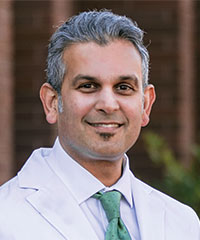
Suketu Khandhar, MD
“Many of our patients with MS, who often are quite educated about this condition and connected with multiple support groups, are seeking this type of specialized care,” says Suketu Khandhar, MD, TPMG chair of neurology, who practices at Kaiser Permanente Sacramento. “They want to be seen by MS experts because it can help improve outcomes and quality of life.”
Dr. Khandhar and other TPMG colleagues credit Dr. Marcus with building a multidisciplinary multiple sclerosis program in Kaiser Permanente Northern California, a program that now includes seven neurologists with MS fellowship training, as well as other dedicated MS clinicians, such as pharmacists.
Dr. Marcus has served as director since the program launched in 2015, and in this role has led the effort to develop evidence-based guidelines for MS and educate general neurologists and other TPMG physicians about the benefits of using a more aggressive treatment approach. She also has advocated for longer patient visits to provide MS neurologists sufficient time to better address the physical symptoms, mental health challenges, and other aspects of the complex condition.
Dr. Marcus, who practices at Kaiser Permanente San Francisco, values the long-standing relationships she has developed with her patients, as she works with them to forestall disease progression.
“We’re in it together for the long haul,” Dr. Marcus says. “It really does bring you closer to a person to know the nuances of all the things they are struggling with. I love being a part of their lives and trying to help them. I find it very rewarding.”
Tackling a progressive disease

The multidisciplinary program that Dr. Marcus built includes seven neurologists with fellowship training in multiple sclerosis, as well as other dedicated MS clinicians, such as pharmacists.
A young Ms. Marcus was pursuing a bachelor’s degree in biology at Brandeis University and was already considering a career in medicine, when one of her family members went to the doctor complaining of unusual symptoms and was diagnosed with multiple sclerosis. Ms. Marcus subsequently enrolled in more neuroscience classes so that she could learn about the autoimmune disease.
But it wasn’t until she began medical school rotations at Emory University that she decided to specialize in neurology. Later, during her residency at UCSF, she chose to further specialize in multiple sclerosis.
“I found myself gravitating toward the patients who had MS because I understood what they were going through, based on the experience of my family member,” Dr. Marcus says. “Also, the patients often happened to be young women like me.”
Multiple sclerosis is the most common progressive neurologic disease in young adults, typically emerging between the ages of 20 and 40. The disorder is three times more common in women than in men and occurs when the immune system attacks the myelin sheaths that coat the axons of the central nervous system. While the precise cause remains unknown, some factors have been associated with increased risk, including having a first-degree relative with MS and prior exposure to infections like the Epstein-Barr virus.
Early symptoms might include vision difficulties, muscle weakness or tingling, numbness, fatigue, or pain in various parts of the body. Other symptoms may appear, including bladder control issues and sexual dysfunction. But how the disease progresses will vary from person to person and is difficult to predict.
Approximately 85% to 90% of patients receive an initial diagnosis of relapsing-remitting MS, which is characterized by periods of disease remission that can stretch on for months or even years. Some of these patients go on to develop secondary progressive MS, in which symptoms no longer remit and steadily worsen. Another type is primary progressive MS, affecting at least 10% of patients, in which symptoms gradually worsen from the start.
The clinical approach to caring for patients with MS has shifted somewhat since the first disease-modifying therapies, which work by slowing progression and reducing relapses, became available in the early 1990s. For many years, as Dr. Marcus explains it, physicians’ treatment algorithm was one of escalation. They started by prescribing medications with fewer safety issues, such as vulnerability to infection, and then switched to more immunosuppressive drugs when patients showed signs that their disease was progressing.
But over the last eight years or so, it’s become increasingly apparent that starting patients on stronger immunosuppressive drugs first may be more effective, especially in those patients with relapsing-remitting MS or active secondary progressive MS, Dr. Marcus says.
“We’ve learned that by putting people on the most immunosuppressive drugs first, you are more likely to not see them accumulating neurological disability, which is our concern with this disease.”
Strategic care management
One of Dr. Marcus’ first steps as director of the newly created regional MS program was to partner with TPMG Consulting Services to develop a business plan and pursue other measures to build a more comprehensive MS service.
Working with colleagues both within and outside of TPMG, Dr. Marcus compiled regional evidence-based guidelines focused on optimal treatment approaches for different types of MS. She launched a multipronged effort to educate colleagues, and also shared her expertise outside California, including hosting an MS symposium for the Mid-Atlantic Permanente Medical Group about the use of more immunosuppressive medications.
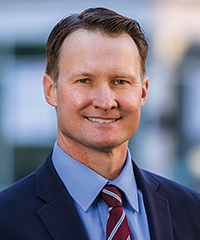
Brian Missett, MD
“Dr. Marcus is a fantastic teacher,” says Brian Missett, MD, TPMG associate executive director, “and one of the things that I respect the most about her is her patient-centric approach, whether that’s educating colleagues or making the case for more funding for MS care. She is a superb advocate for these patients because she profoundly understands how debilitating the disease can be.”
Dr. Marcus also was instrumental in the creation of detailed clinical guidelines for how to address the numerous symptoms and complications that may arise with MS, such as first-line management for depression, sexual dysfunction, and fatigue.
“She went through each of the many potential symptoms and came up with suggested clinical management strategies,” says Mark Waheed, DO, a neurologist at Kaiser Permanente Sacramento and one of the first MS specialists to join TPMG after Dr. Marcus. “I remember reading through it and being quite impressed with the effort involved and volume of the work.”
“What Dr. Marcus wanted to do was to create a standard approach to treating MS,” adds Dr. Khandhar. “If somebody has this subtype of MS, for instance, then they should probably be on this medication. If somebody has that subtype of MS, they should probably be on another medication.”
Expanding patient support
Patient medication decisions are highly individual, and in consultation with their physician, patients may decide on a less immunosuppressive approach, Dr. Marcus says. For instance, a patient may have minimal symptoms or not be comfortable with the additional safety risks of higher efficacy medications. Or they may be getting treatment for other diseases, such as cancer, that already suppresses their immune system.
For other patients, though, the higher efficacy drugs may prove to be the optimal course. During the first six months of 2024, nearly 75% of patients in Kaiser Permanente Northern California opted for high-efficacy therapies, compared with 10% in 2012.
Patients may be cared for primarily by an MS specialist or a general neurologist, depending upon factors that include patient preference, where they live, the complexity of the disease, and related symptoms, Dr. Marcus says. In some cases, patients may consult with an MS specialist early on and then obtain ongoing care with a general neurologist closer to home.
“Dr. Marcus has helped us to not only stay on track with recent advances in treatment and understanding of the disease, but also stay one step ahead.” —Suketu Khandhar, MD
The regional physician education provided by Dr. Marcus “has provided better patient care and improved outcomes for all MS patients,” Dr. Khandhar says. TPMG has also been able to invest in additional clinical support for MS patients, he says, including pharmacists designated to assist multiple sclerosis patients, regardless of whether they’re seeing an MS specialist or a general neurologist. Building this pharmacist expertise for MS patients, he says, is “one of the biggest legacies that Dr. Marcus has helped create within the organization.”
Given the complexities involved with MS treatment, specialized pharmacists can help further educate patients about the pros and cons of medication options, as well as field questions that may arise during treatment, including side effects, potential drug interactions, and the timing of vaccines, Dr. Marcus says.
The regional MS program, which continues to grow, has recently expanded the number of MS specialists who, along with general neurologists, treat more than 7,000 Kaiser Permanente Northern California patients living with the disease. One of Dr. Marcus’ longer-term goals is to provide the more recently added MS specialists with additional clinical support beyond pharmacy, such as physician extenders, as they expand their practices. Her patients, she notes, rave on surveys about their access to her team, which also includes a nurse and a physician assistant.
“People love that there’s someone who quickly responds to them, and that they have more than one clinician they can go to with questions,” she says. “They don’t have to worry how things will work when I’m on vacation.”
Addressing MS complexities
Dr. Waheed, who was hired in 2018, describes Dr. Marcus’ leadership style as inclusive. “She’s good at actively soliciting input from others and asking about alternative approaches — just seeking collaboration from everybody involved.”
He also credits her with advocating for patients to have longer visits with their MS specialty physicians. “It makes all the difference in the world,” he says. “We can address the various challenges the MS patient may have, which might include everything from panic attacks, spasticity, and overactive bladder, to seizures, migraines, and nerve pain.”
The additional time also helps build rapport, Dr. Waheed adds, which is critical for patients who have a progressive disease. “With good rapport, they feel like they can share more with you. And the better you know them at their baseline, the better you are at recognizing when something is seriously wrong, and when they might be having a clinical relapse.”
As it turns out, there’s a “paradoxical efficiency” related to longer MS appointments, says Kenneth Fox, MD, chief of neurology at Kaiser Permanente San Francisco. “We’ve found that the more time we spend with patients answering their questions and thoroughly addressing their concerns, the less frequently they need to schedule additional office visits or send secure messages asking for clarification or more information.”
Dr. Fox, who hired Dr. Marcus and was instrumental in helping her get the regional program off the ground, describes how she leads with empathy. “She’s frequently suffering through the condition with her patients. She inspires everyone around her to follow her lead in being so compassionate.”
Hailey Smith, a patient whose last name has been changed to protect her privacy, started seeing Dr. Marcus eight years ago, after she was diagnosed with relapsing-remitting MS the day before her 30th birthday. She was initially prescribed glatiramer acetate, an immunomodulator that requires daily injections, but quickly learned that the logistics of this regimen were too difficult amid her work travel schedule. Plus, the drug didn’t seem to notably alleviate her numbness and other symptoms.
After discussing other medication options with Dr. Marcus, Ms. Smith switched to twice-yearly infusions of rituximab, a monoclonal antibody. “I opted to be really aggressive from the outset, as soon as I was given that option,” she says. Since then, her numbness and other symptoms have largely vanished and are primarily limited to heat sensitivity. “I get to live a normal life.”
More recently, the 38-year-old reached out for the neurologist’s counsel, first when she wanted to start in vitro fertilization treatments, and later to discuss how to time her infusion treatments while breastfeeding. Together they decided to delay the next infusion by a month so that she could breastfeed her baby for longer.
“I always feel like we’re collaborating to figure out a solution,” says Ms. Smith. “I was able to leave my conversation with her feeling like I was doing the best thing for myself and my baby, which is really important.”
Always moving forward
Dr. Marcus explains that her push to develop a regional program and hire more MS experts was, in addition to increasing patient access to specialized care, also a step toward preserving her resilience. Her panel reached full capacity not long after she joined the organization, and with so many highly complex patients, she realized she needed additional support, too.
Her expanding family — her son is 6 and her daughter is 3 — motivated her even further. “The kids are very small and need us a lot,” she says. Vacations tend to revolve around visits to the East Coast, where both she and her husband have family and friends.
“She’s someone I admire,” Dr. Waheed says, “for how she’s managing to work these intense full-time hours and also raise two young children.”
Given the daily challenges that some of her patients face, Dr. Marcus doesn’t take for granted that she’s been able to stay active enough to put in a 3.5-mile run to Golden Gate Park in San Francisco every day and practice yoga several times a week. She also engages her colleagues in activities and sometimes breaks away with them for a bit of karaoke.
“Her legacy is certainly not complete,” Dr. Khandhar says, noting that Dr. Marcus has an “abundant amount of energy” in her commitment to improving MS care.
“The world of MS has changed quite a bit in the last decade,” he says. “Dr. Marcus has helped us to not only stay on track with recent advances in treatment and understanding of the disease, but also stay one step ahead.”
This article originally appeared in Permanente Excellence, the magazine for physicians in The Permanente Medical Group.


